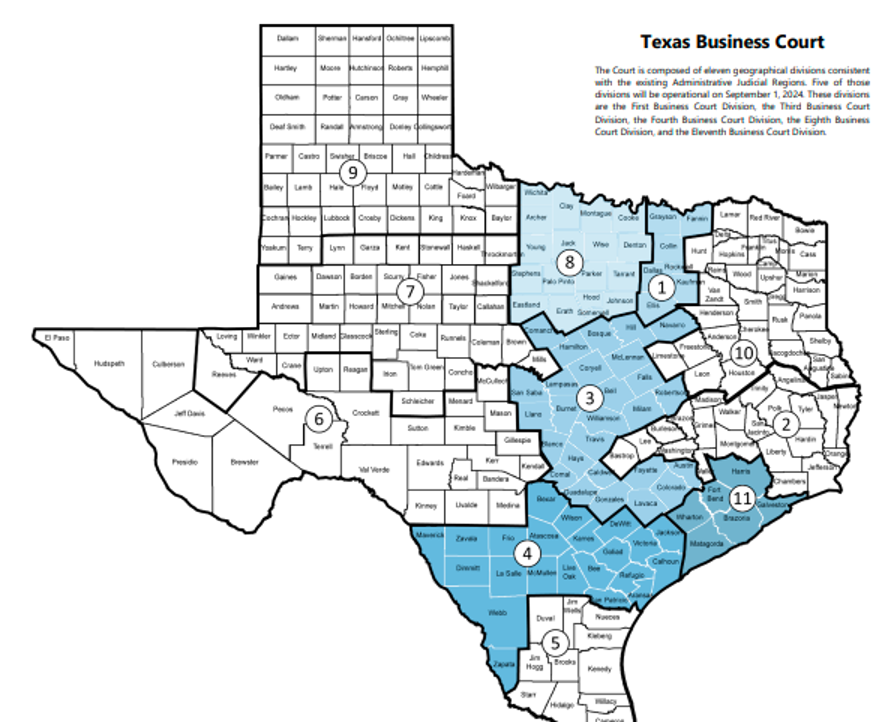Texas Business Courts

On September 1, 2024, the Texas Business Court and Fifteenth Court of Appeals, created by the Texas Legislature will begin hearing cases. The purpose of the new Business Courts was to provide specialized venue for commercial disputes presided over by judges experienced in commercial disputes. Reviewing the structure and function of the Texas Business Court may assist in deciding whether a case is appropriate to be moved to these Courts.
The Business Courts are divided into eleven regions but only 5 of the Districts currently have judges appointed. Those regions are in the First, Third, Fourth, Eighth, and Eleventh Division (which sit, respectively, in Dallas, Travis, Bexar, Tarrant, and Harris counties) will each have two appointed judges when the Business Court is created on September 1, 2024. The remaining divisions of the Business Court will not have an appointed judge until at least July 1, 2026.
Judges appointed to the Business Court must meet certain requirements, including at least 10 years’ experience in practicing complex civil business litigation; practicing business transaction law; serving as a civil judge within the state; or a combination of the three. Business Court judges are appointed by the Governor, not elected, and they will serve a two-year term. Accordingly, litigants may need to weigh the value of a judge’s expertise with the potential that a case may change hands in the middle as a result of the presiding judge’s relatively short term.
The judges who have been appointed are:
- The Governor appointed Sofia Androgue and Grant Dorfman to be judges of the Eleventh Business Court Division in Houston. Adrogué is a partner with Diamond McCarthy LLP and a member of the Houston First Board of Directors. A resident of Bellaire, Texas, Dorfman is a Visiting Judge and former Deputy First Assistant Attorney General for the Office of the Texas Attorney General.
- Marilyn Barnard and Stacy Sharp have been appointed judges of the Fourth Business Court Division in San Antonio. Barnard is Judge of the 73rd Judicial District Court in Bexar County. Sharp is an attorney and owner of Sharp Appellate PLLC and an adjunct professor at The University of Texas at Austin.
- Jerry Bullard and Brian Stagner will preside over the Eighth Business Court Division in Fort Worth. Bullard is board certified in civil appellate law by the Texas Board of Legal Specialization and a shareholder and attorney with Adams, Lynch & Loftin, P.C. Stagner is of counsel and a former partner at Kelly Hart & Hallman LLP and an adjunct professor at Texas Christian University teaching business law.
- Andrea Bouressa and Bill Whitehill will be judges of the First Business Court Division in Dallas. Bouressa is Judge of the 471st Judicial District Court and recently served a two-year term as Local Administrative District Judge for Collin County. Whitehill is a member of Condon Tobin Sladek Thornton Nerenberg PLLC and is a former Justice of the Texas Fifth Court of Appeals in Dallas.
- The Governor appointed Melissa Andrews and Patrick Sweeten to be judges of the Third Business Court Division in Austin. Andrews is board certified in civil appellate law by the Texas Board of Legal Specialization and an equity partner at Holland & Knight. Sweeten is the Principal Deputy General Counsel for the Office of the Governor.
The Business Court has limited concurrent jurisdiction with state district courts. First, it may hear cases with at least $5 million in controversy if the action relates to corporate governance or derivative proceedings; by an organization or owner against the organization or owner concerning an act or omission by the owner in their organizational capacity; is against an owner, controlling person or managerial official of an organization for breach of a duty owed to the organization; seeks to hold the owner or governing person of an organization liable for an obligation of the organization; state and federal trade or securities-related actions against an owner, controlling person or managerial official; or, arises out of the Business Organizations Code.
Second, it may hear cases exceeding a $10 million amount-in-controversy if the action arises out a qualified transaction (a transaction, which is not a loan by a bank, with an aggregate value of at least $10 million); involves contractual or other commercial transactions in which the parties agreed that the Business Court has jurisdiction over the action (except insurance contracts); or, is against an organization or officer arising out of a violation of the Finance Code or Business and Commerce Code, subject to specific exclusions.
Third, the Business Court has jurisdiction over cases against publicly traded companies (defined as an entity whose voting equity securities are listed on a national securities exchange registered with the SEC under Section 6 and any entity that is majority owned or controlled by such entity) without regard to an amount-in-controversy if the action’s subject matter otherwise would be subject to the Business Court’s jurisdiction. Thus, parties seeking to invoke the Business Court’s jurisdiction should be able to do so with a carefully drafted forum selection clause.
To proceed in the Business Court an action may be originally filed there, removed from district court by a party’s notice of removal, or removed by the district court’s own request. Either the pleading or notice of removal must contain facts establishing the Business Court’s jurisdiction and the venue. Much like removal to federal court, actions that have been removed from district court to the Business Court may be remanded.
There are no special timelines, deadlines, or rules for the Business Court. Rather, the Business Court is governed by the same rules and procedures as district courts. A party is still entitled to a trial by jury in the Business Court. Appeals from the Business Court will be exclusively overseen by the newly created Fifteenth Court of Appeals, and the procedure for an appeal from the Business Court is the same as procedure for an appeal from a district court. Filing fees for proceeding in Business Court are more than expensive (a filing in a district court is $350 and in the Business Court it’s $2,500). Another key difference between a district court and the Business Court is that the Business Court judge, if requested, must provide a written opinion in connection with a summary judgment motion and cannot just grant or deny the motion.
Here are some other procedural rules for the Business Courts:
- Authority and Venue (Rule 354) – For an action originally filed in the business court, a party must plead facts to establish the business court’s authority to hear the action and to establish venue in a county in an operating business court division. If the business court lacks authority, it may transfer or dismiss the action without prejudice upon a party’s motion or the court’s own initiative. If the venue is improper, the business court may transfer the action upon a party’s motion.
- Removal (Rule 355) – The procedure for removing an action to the business court is patterned off the procedure for removing an action to federal court, although there are some differences. For an action originally filed in a district or county court, a party may remove the action to the business court by filing a notice of removal at any time during the pendency of the action if all parties agree to removal or within a shortened time frame if all partes have not agreed to removal. The business court must remand the action if it determines, upon motion or its own initiative, that removal was improper.
- Transfer (Rule 356) – On its own initiative, a court may request that an action be transferred to the business court by the presiding judge for the administrative judicial region, which gives significant power to judges. The parties may object to transfer and have a hearing held, challenge any denial of transfer via a petition for writ of mandamus, and seek remand from the business court.
- Statute of Limitations (Rule 357) – This rule gives the filing party the brief ability to avoid the statute of limitations in the event the business court dismisses an action or claim. If the business court dismisses the action or claim and a party files that same action or claim in a different court within 60 days, then the applicable statute of limitations is suspended for the period between the filings.
The belief is that because the Business Courts have limited jurisdiction, their dockets will have fewer cases and can hopefully proceed to trial relatively quickly. And with judges experienced in commercial litigation it may be easier to dispose of meritless cases and limit the real issues in dispute.
If you should have any questions or comments about business courts, please contact us at info@gstexlaw.com.
Legal Disclaimers
This blog is made available by Gerstle Snelson, LLP for educational purposes and to provide general information about the law, only. Neither this document nor the information contained in it is intended to constitute legal advice on any specific matter or of a general nature. Use of the blog does not create an attorney-client relationship with Gerstle Snelson, LLP where one does not already exist with the firm. This blog should not be used as a substitute for competent legal advice from a licensed attorney.
©Gerstle Snelson, LLP 2024. All rights reserved. Any authorized reprint or use of this material is prohibited. No part of this blog may be reproduced or transmitted in any form or by any means, electronic or mechanical, including photocopying, recording, or by any information storage or retrieval system without the express written permission of Gerstle Snelson, LLP.


